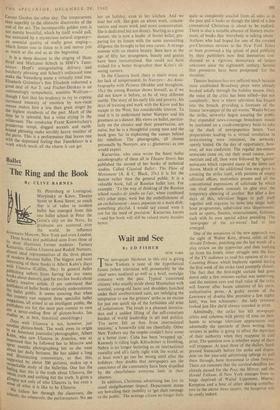Wait and See
By ED FISHER
NEW YORK
MILE newspaper blackout in this city is giving I New Yorkers a taste of the hypothetical future (when television will presumably be the
chief news medium) as well as a brief, nostalgic
romance with the• past. Typical 'concerned citizens' who usually stride about Manhattan with
worried, young-old faces and shoulders hunched under their sombre-toned suits, are indulging the temptation to use the printers' strike as an excuse for just one quick sip of the forbidden old wine of isolationism. The result is a pleasant intoxica- tion and a sudden lifting of the self-conscicius burden of world leadership in art and politics. 'I've never felt so free from international tensions,' a housewife told me cheerfully. Other New Yorkers say the respite couldn't have come at a better time: Cuba has been 'wrapped up,' Kennedy is riding high, Khrushchev is fumbling, Nehru is no longer lecturing us on international morality and all's fairly right with the world, or at least won't go too far wrong until after the holidays. Any doubts that newspapers are the conscience of the community have been dispelled by the cheerfulness everyone feels in their absence.
In addition, Christmas advertising has lost its usual sledgehammer impact. Department stores are bewailing their inability to `get their message to the public.' The average citizen no longer feels
quite so completely assailed from all sides as in the past and it looks as though the ideal of a less commercial Christmas is about to be realised. There is also a notable absence of literary excite- ment, of books that 'everybody is talking about.' Authors who had hoped for one of the coveted pre-Christmas reviews in the New York Times or been promised a big splash of paid publicity by their publishers now find themselves con- demned to a rigorous democracy of letters unknown since the eighteenth century. Several film premieres have been postponed 'for the duration.'
Theatre business has not suffered much because most established Broadway plays were already booked solidly through the holiday season. Only the voice of the critic has been stilled—but not completely : here is where television has leaped into the breach, providing a foretaste of the future 'newspaper of the air-waves.' Weeks before the strike, networks began assuring the public that expanded news-coverage broadcasts would be instituted on a crash-emergency basis to take up the slack of newspaperless hours. Vast preparations leading to a virtual revolution in news-viewing were imminent, the networks openly hinted. On the day of opportunity, how- ever, all was confusion. The regular ten-minute newscasts came on, ran their usual course, com- mercials and all, then were followed by 'special' newscasts which repeated many of the items just shown. Much of the additional time was given to covering the strike itself, with pictures of empty editorial offices, motionless presses and all the conventional expressions of solicitude by which one rival medium conceals its glee over the temporary silencing of another. But after a few days of this, television began to pull itself together and organise its news into single half- hour programmes, subdivided into 'departments' such as sports, finance, entertainment, fashions, each with its own special editor presiding. The 'newspaper of the air-waves' bad at last emerged.
One of the sensations of the new approach was the sight of Walter Kerr, drama critic, of the Herald Tribune, punching out the last words of a play review on the typewriter and then looking up from his lonely inner struggle into the face of the TV audience to read his opinion of In the Counting House which haplessly opened during the first week of the strike (and promptly closed The fact that the first-night curtain had gone down only a few minutes earlier was unnerving, and the anxious eyes and frail voice of the critic will forever after haunt admirers of his stern. authoritative prose. A gushy review of the Lawrence of Arabia film premiere a few, nights later, was less schismatic: the lady reviewer , looked just like she'd always sounded in print.
Admittedly, the strike has left newspaper critics and columns with plenty of time on their hands to arrange television appearances and admittedly the spectacle of them writing their reviews in public is going to affect the mystique of their authority when they reappear in cold print. The question now is whether many of them
will reappear. At least three of the dailies, hard- pressed financially before the strike and depen- dent on the year-end advertising splurge to pull them through, have threatened to close forever. There are rumours that the survival-deadline has already passed for the Post, the Mirror, and the
Herald Tribune. If New York emerges from its binge deprived of Walter Lippmann, Murray Kempton and a host of other shining contribu- tors to the above three papers. the hangover will be costly indeed.






























 Previous page
Previous page